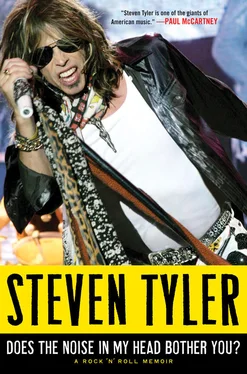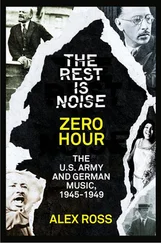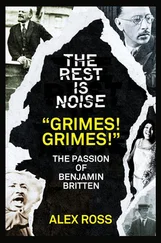Sunapee, New Hampshire, was where I spent my summers as a kid. Driving up to Sunapee we’d go past Bellows Falls and Mom would say, “Bellows Falls? Fellow’s Balls!” There was so much to my mother. Like the way she’d get me to eat my peas. “Whatever you do, do not eat those!” And I gave her a frog smile.
A few years later, say around 1961, when I’d call for my mother from the other side of the house, my mom would go, “Yo! Where are you? Where’d you go?” Now I wonder where she’s gone. She was a beautiful Philadelphia Darby Creek country girl who came to the city to bring us up, let me have long hair in school, argued with the principals, drove us to our first club dates, and loved and nurtured me—the whoever I was and/or wanted to be.
In the fifties, it would take us seven hours to go from New York up to New Hampshire because in those days it was all on back roads (there were no highways). But the ride up to Sunapee was filled with fantastic roadside attractions. A giant stone Tyrannosaurus rex on the side of the road, wooden bears, Abdul’s Big Boy, and the Doughnut Dip, with a huge concrete doughnut outside.
Trow-Rico, our summer resort in New Hampshire, was named after Trow Hill, a local landmark, and Tallarico, my father’s name, just smushed together. The cottages were on 360 acres of nothing but woods and fields. It was my grandfather Giovanni Tallarico’s dream when he came over from Italy in 1921 with four other brothers. Pasquale was the youngest, a child prodigy on the piano. Giovanni and Francesco played mandolins. Michael played guitar. They were a touring band in the 1920s—it’s where I get my on-the-road DNA. I’ve seen brochures for the Tallarico Brothers—they performed in giant hotels with huge ballrooms in places like Connecticut and Detroit. They went from New York by train to these hotels all over the country and played their type of music, to their type of people. Sound familiar?
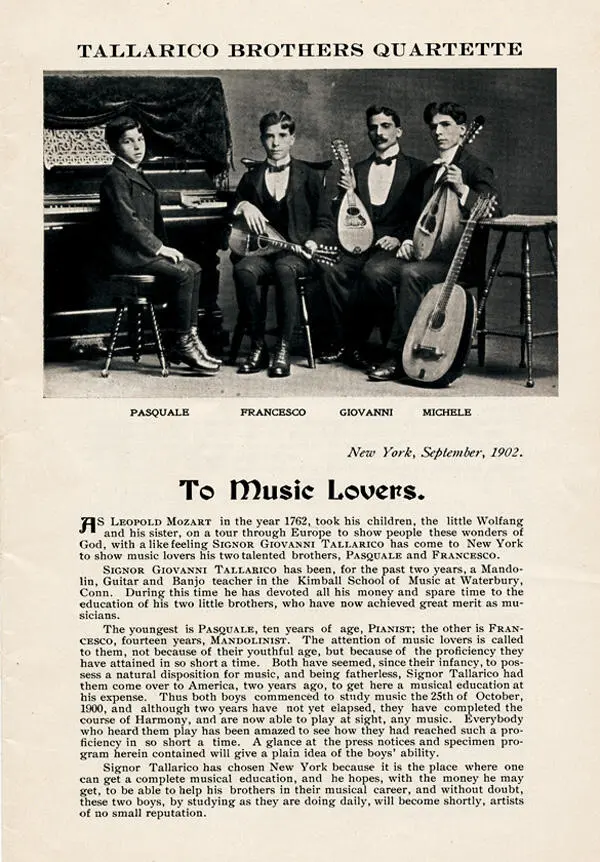
Where it all began . . . or, why I must love to tour.
My mother’s father—that was another story. He got out of Ukraine by the skin of his teeth. The family owned a horse-breeding ranch. The Germans invaded and machine-gunned the family down in front of my grandfather. “Everyone out of the house!” Bb-r-r-r-r-a-t! They gunned down his mother, father, and sister. He got away by jumping down a well and managed to grab the last steamer to America.
Trow-Rico is where I spent every summer of my life until I was nineteen. On Sundays my family would throw a picnic for the guests. My uncle Ernie would cook steaks and lobsters on the grill, and we’d make potato salad from scratch. We served all the guests—which came to what? eight families, some twenty-odd people—in our heyday. After dinner, while the sun was going down, we’d fill in the trailer with hay, attach it to the back of a ’49 Willys Jeep, and take everybody on a ride all over the property. We also had a common dining room where we served them breakfast and dinner, and guests would do lunch on their own, all for, like, thirty dollars a week. Sometimes six dollars a night. And when the people left, my whole family got pots and pans out of the kitchen and banged them all together—behold the origin of your first be-in!
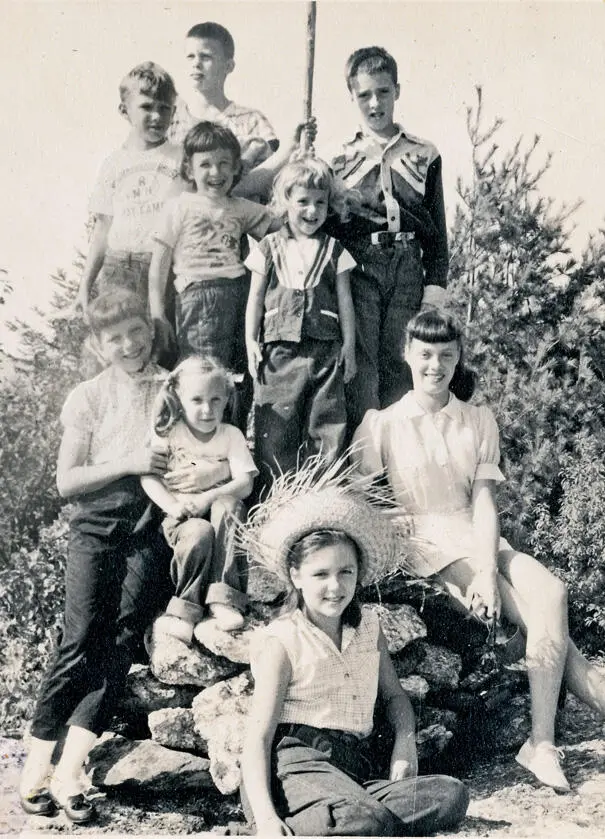
Summer of 1954 at Trow-Rico. I’m at the top on the left, Lynda is in the straw hat, and Sylvia Fortune, my first girlfriend, is on the right with her legs crossed. I was infatuated with her. . . . (Ernie Tallarico)
As soon as I was old enough, they put me to work. First it was clipping hedges. When I snapped back, “What do I have to do that for?” my uncle said, “Just make it nice and shut up.” He used to call me Skeezix. He’d spent most of World War II in the Fiji Islands, so he knew how to take care of business and anything else that gave us any trouble. I helped him dig ditches and put in a water pipeline over a mile of mountain and dug a pond with my bare hands. I washed pots and dishes at night and mowed the lawns with my father when I was old enough to push a mower. I cleaned toilets, made the beds, and picked up all the cigarette butts that the guests left behind.
We would rake up the hay with pitchforks and put it in the barn below the lower forty. The downstairs of the barn was empty except for maple syrup buckets and wooden and metal taps for the trees that some family had left before we lived there. It was quite an adventure going down there—full of spiderwebs, stacks of buckets, glass jars, and artifacts from the twenties and thirties—all those dusty, rusty things kids love to get into—me in particular.
Upstairs in the barn, there was a hayloft door with an opening where you’d load the hay in and out. I could climb up there and jump down from the rafters of the ceiling. I did my first backflip in that barn, because the hay was so soft, it was like landing on, well, hay. I always kept an eye out for pitchforks left behind. Land on one of those suckers and I would have learned how to scream the way I do now . . . twenty years earlier.
Before I could go to the beach with the rest of the guests I had to finish doing my chores. After a while I came up with a plan. It was called: get up earlier.
Every Tuesday, Thursday, and Saturday during the summer my father played the piano at Soo Nipi Lodge along with my uncle Ernie on sax. They had a trumpet player named Charlie Gauss, a stand-up bass player named Stuffy Gregory, and a drummer who will go unnamed. Soo Nipi Lodge—which today would probably be called Snoop Dog Lodge—was one of the classic old hotels, like the one in The Shining: all wooden and splendiferous and huge, with dining rooms and decks outside with rocking chairs and screened-in porches. Chill central by today’s standards. They began building these resorts in the 1870s, when horses and buggies brought the guests from the train station to the hotels. The only thing missing was the musicians to play music and entertain the guests—and this is probably how the Tallarico brothers came to buy the land there.
During Prohibition, people would take the train up from New York to Sunapee, and the booze would come down from Canada. Some folks drank, some didn’t. Maybe they came up for the weekend to see the leaves turn, but I have a funny feeling they got on the train for a quick weekend away—take horse-and-buggy rides, stay at the big hotels, and cruise in the old steamboats. The ones in Sunapee Harbor today are replicas of the original ones from a hundred years ago. Very quaint. Ten miles up the road was New London, the original Peyton Place, where, oddly enough, Tom Hamilton was born. But then again, it all makes perfect sense to me now.
On Sunday nights, Dad would give recitals at Trow-Rico. People from miles around would come over to hear him, and my grandma, my mother, and my sister would play duets. All the families that came up had kids, and Aunt Phyllis would holler, “C’mon, Steven, let’s put on a show for them!” Downstairs from the piano room was the barn’s playroom: Ping-Pong, a jukebox, a bar, and, of course, a dartboard. There was also a big curtain across one corner of the room that made a stage where my aunt Phyllis taught all the kids camp songs like “John Jacob Jingleheimer Schmidt” and the “Hole in the Bucket” song. I would pantomime to an old 78 recording of “Animal Crackers.” It was an evening of camp-style vaudeville. For the finale, we hung a white sheet in front of a table made from two sawhorses and a board. Someone from the audience would be brought back to lie on the board, and behind them a giant lamp cast shadows on the sheet. My uncle Ernie would perform an operation on the person lying down, pretending to saw him in half and eventually pull out a baby—quite horrifying and hilarious to the audience. It was all very tongue-in-cheek but certainly the beginning of my career.
Читать дальше
